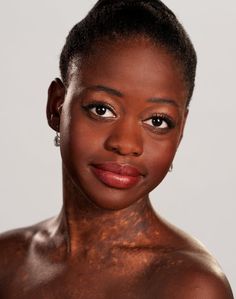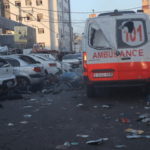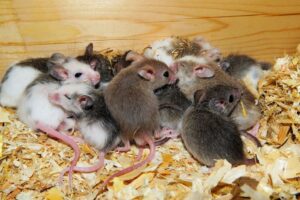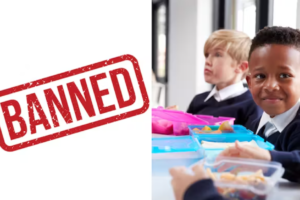Michaela DePrince is a young ballerina that as a child witnessed things that no child should have to see.
She grew up as an orphan in Sierra Leone and saw her loved ones killed by rebel soldiers who invaded her village and brutally slaughtered every man, woman and child who got in their way.
Born Mabinty Bangura in war-ravaged Sierra Leone in 1995, rebels killed her father who worked at the diamond mines when she was three.
Her father taught her to read at a very young age during a time when it wasn’t very common for girls to learn how to read. He also did not take a second wife, even though it was common for men to do this.
When her father died, she and her mother was then taken in by her uncle Abdullah, a cruel man who thought she should be put to work rather than learning how to read.
Under Sharia law, her uncle became their legal guardian and could request to marry her mother, as her father had now died.
Sharia law also allowed her mother to refuse which she did. In revenge, her uncle would often make them both go without food, and her mother died shortly after from lassa fever, a disease similar to Ebola.
Her uncle burned all of her mother’s belongings, afraid his son (the only other person he cared about) would get it.
Because of her skin condition vitiligo, Michaela often found herself alone, as many of the other kids, apart from some of her cousins, refused to play with her.
The orphanage
Her salvation came when a man named Andrew Jah from the local orphanage convinced her uncle to hand her over, when he spotted her talent for reading and writing.
For a long time, the rebels who were nicknamed ‘debils’ (a combination of rebels and devils) in Sierra Leone left her orphanage alone.
However, Michaela witnessed the death of one of the orphanage teachers’ when she got accosted by one of the soldiers at night.
The teacher who was pregnant at the time, and – one of the few that was nice to Michaela- had made the mistake of walking out alone after the dark, when the soldiers were high on drink and drugs.
Pregnant women were subject to particularly brutal treatment. The soldiers would cut open women’s bellies to see what sex the foetus was.
“If they found a boy they would let the woman go, or kill the mother and save the child,” DePrince explained. “But they found a baby girl when they cut my teacher’s stomach open, so they cut her arms and legs off.”
Michaela’s teacher and her baby was killed once they cut her open and saw that she had a girl.
Michaela ran out after her teacher and a younger soldier, perhaps trying to impress the two older ones, took a machete to
Michaela’s stomach and she blacked out. She was rescued when the other young girl called Mabinty called for help.
Then one day, they invaded the orphanage in the middle of the night, as the children hid. The the director Andrew Jah (nicknamed Papa Andrew) was ordered to get everyone to come out of their hiding places, under the promise they would not harm the children.
Mercifully the soldiers kept their promise but told them all to leave the building, which they then took over.
The children along with the orphanage teachers fled to nearby Guinea despite being warned not to by the rebels and were forced to walk past hundreds of dead bodies – many still had the look of terror on their faces.
Inspiration
Clutching nothing, but an old magazine she had found with a picture of a “white lady . . . wearing a very short, glittering pink skirt that stuck out all around her,” on it, Michaela fled with the other children.
That magazine clip, Michaela recalls, was the only thing that kept her going.
The ballerina in the picture was Magali Messac, who danced for the Dutch National Ballet. As fate would have it, Michaela in the future would achieve her dream to be a ballet dancer, joining that same company in August 2013. She is also in regular contact with Magali and they hope to meet one day.
Adoption
In the orphanage, the children, were all given numbers, one to 27, and were told they were all matched with adoptive American families.
Those numbered ‘one’ were considered the most favourable for adoption. Michaela was given number 27 – the least favourable.
Unfortunately for Michaela, she was last on the list as many of the families did not want to adopt her due to her skin condition and she was rejected by 12 families.
Her best friend, the one who called for help when Michaela was attacked, was number 26. The ‘aunties’ at the orphanage despised her friend, because she was left-handed.
They despised Michaela because of her vitiligo and called her ‘the devils child’. Furthermore, they encouraged the other children not to play with her because of it.
However, Michaela’s friend, Mabinty, was adopted by an American lady called Elaine DePrince.
Elaine and Charles DePrince had originally just planned to take the one child, but at the last minute, decided they couldn’t take one without the other so they, took Mabinty Bangura (Michaela) as well.
With both girls having the same name, they then decided to call themselves Michaela and Mia instead once adopted.
America
America was like a fantasy dream world for Michaela. The little things that many of us so often take for granted, such as shopping carts full of food, toilets, automatic machines, all seemed amazing to Michaela.
In America, Michaela also got her chance to practice ballet dancing, with the full support of her new mother Elaine.
Elaine herself has faced some trials and tribulations in her lifetime. Elaine who already had two biological sons, now both in their 40s, had also adopted three other sons, Michael, Cubby and Teddy. All three were haemophiliac and unknowingly injected themselves with HIV-infected blood and later died of Aids, with two of them passing away when they were teenagers.
One of their sons Michael was fascinated with Africa and knew the names of many cities and countries across the continent. He vowed to become a neurosurgeon and adopt children from there when he got older. Unfortunately, he passed away before that dream was realised.
His mother, Elaine and Charles however, did adopt many children from Africa, partly in honour of his memory.
Eventually both parents would go onto adopt a total of six girls from Africa.
Racial stereotypes
Now as a successful ballet dancer that tours the world, Michaela said people still have racial stereotypes about her ability, and recalls overhearing one American lady saying that ‘black girls should not be in ballet as they are too athletic’.
However, as a survivor of one of the most brutal regimes in the world, none of that has stopped Michaela from realising her goals and aspirations, and she continues to be an inspiration to this very day.
Akashic Times is the UK’s only online, fully independent not-for-profit newspaper that brings you real news from across the globe.
If you want to keep ahead of what is really going on in the world, subscribe to our newspaper via the subscribe button and join our Facebook & Twitter pages. Subscription is completely free ofcourse


















Follow Us!